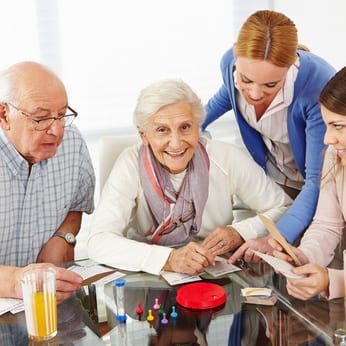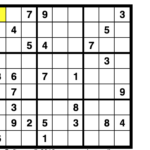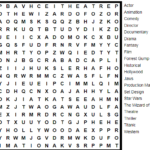 When a family member or loved one is affected by Alzheimer’s or other forms of dementia, it is important, for the family and patient to find ways to have quality time together. Donna Munic-Miller, PhD, a psychologist at Lou Ruvo Center for Brain Health, shares fun activities you can both enjoy together.
When a family member or loved one is affected by Alzheimer’s or other forms of dementia, it is important, for the family and patient to find ways to have quality time together. Donna Munic-Miller, PhD, a psychologist at Lou Ruvo Center for Brain Health, shares fun activities you can both enjoy together.
Keep it Personal
Think about what things your loved one enjoyed doing in years past. Did they like listening to music, crafting or reading? Create ways to incorporate their interests into the time you spend together. “Be flexible, creative and keep activities relatively short”, says Dr. Munic-Miller. “Be sure to consider physical limitations and cognitive ability as well ensure activities are voluntary.”
Play Games
Games can stimulate brain activity and help make new connections. Here a few different games to try with your loved one:
- Card games like Uno, Go Fish, Solitaire, Old Maid
- Games like Bingo, Dominoes, Hangman
- Easy word searches, jigsaw and crossword puzzles
Try this simple memory card game:
- Deal 3 or 4 cards
- Look at the cards and then turn them face down
- Try to recall numbers, suits, or both numbers and suits.
- Add more cards if successful.
Build Verbal Skills
Verbal fluency exercises can tap memory, increase self-esteem, and be fun for family members of all ages. For example, try naming words that begin with a certain letter of the alphabet like “D” (dog, donkey, dance, etc.) or belong in a certain category like “things that are green” (grass, grapes, frog, etc.).
For more challenge, try recalling words from two categories like words that begin with an “S” and are “place” (San Francisco, San Diego, South Carolina, etc.).
Arts and Crafts
According to Dr. Munic-Miller art activities bring enjoyment, increase self-esteem, and can tap memory, creativity, motor skills, and hand-eye-coordination. Try attending an art class or craft show. Draw, paint, knit, or play with Play-Doh. Make a family history scrapbook or collage to enjoy for years to come.
Music
Music can stimulate memory, enhance verbal skills, and bring joy. Sing, dance and listen to music together. Play instruments, attend concerts or watch musicals with your loved one. Spark happy memories by creating a CD or playlist of favorite music that can be enjoyed anytime.
Physical Activity
Physical activity helps people feel better, enjoy life more, and allows people to stay independent longer. It can improve sleep, reduce wandering and enhance mood and behavior. Aerobic activity like walking or dancing may improve memory, attention and processing speed as well as decrease the rate of mental decline.
Before starting any exercise, talk to your loved ones physician, start slowly and gradually increase activity. Incorporate home activities like dusting, sweeping, making the bed, and setting the table with movement. Exercise is a fun activity to do together and will benefit you both.
Reminisce
Sit and talk about anything and everything! Interacting in an attentive and unhurried setting helps decrease boredom, encourages socialization and enhances communication. Most importantly, sharing memories together helps increase feelings of closeness.
Try incorporating the five senses of hearing, sight, smell, taste and touch in your activity. Use music, maps, pictures, foods, fashion and movie/tv to help make the reminiscing more fun. Choose fun topics like childhood, places lived, vacations, favorite jobs, sports and holidays. Reminiscing with the whole family can create a legacy and capture important memories for future generations.
Just Have FUN!
Dr. Munic-Miller reminds us, “Participating in the activity itself, is more important than the end result.”
The activities you do together will have an impact on your brain health, too! Revisit HealthyBrains.org to learn more on how connecting to our loved ones is important to our brain health.









